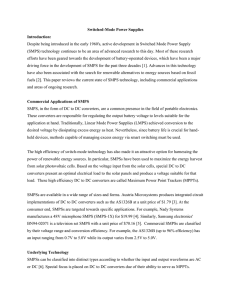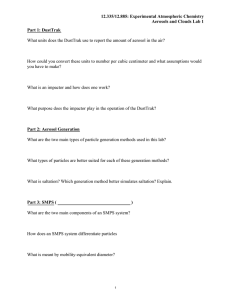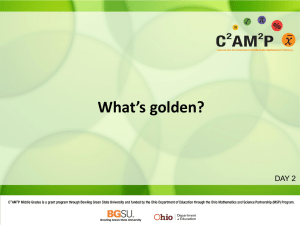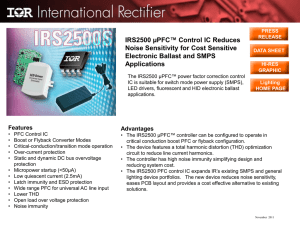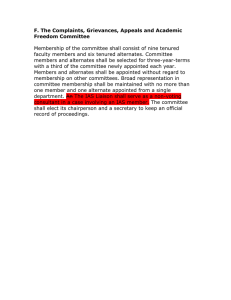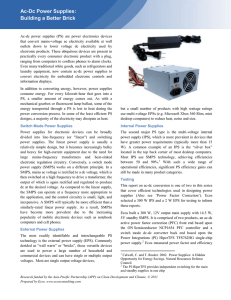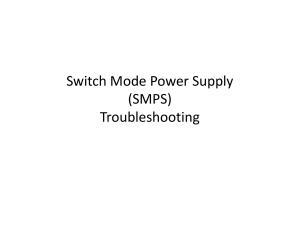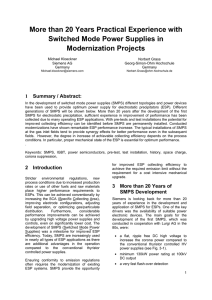ECE 533F - Power Electronics Winter 2015
advertisement
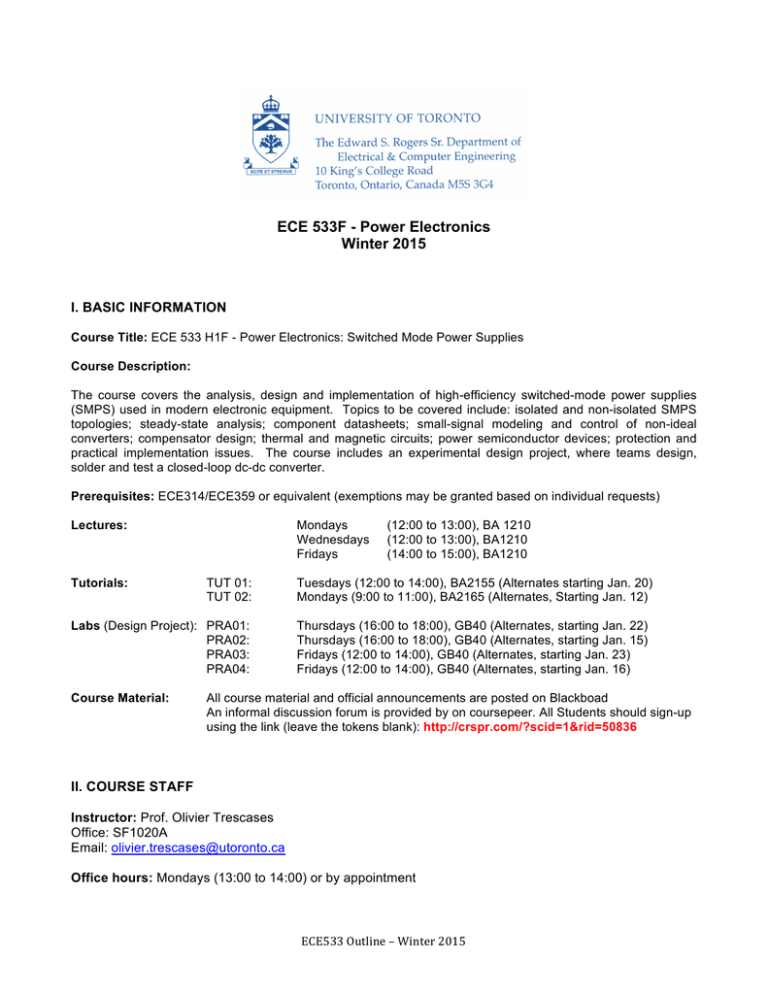
ECE 533F - Power Electronics Winter 2015 I. BASIC INFORMATION Course Title: ECE 533 H1F - Power Electronics: Switched Mode Power Supplies Course Description: The course covers the analysis, design and implementation of high-efficiency switched-mode power supplies (SMPS) used in modern electronic equipment. Topics to be covered include: isolated and non-isolated SMPS topologies; steady-state analysis; component datasheets; small-signal modeling and control of non-ideal converters; compensator design; thermal and magnetic circuits; power semiconductor devices; protection and practical implementation issues. The course includes an experimental design project, where teams design, solder and test a closed-loop dc-dc converter. Prerequisites: ECE314/ECE359 or equivalent (exemptions may be granted based on individual requests) Lectures: Tutorials: Mondays Wednesdays Fridays TUT 01: TUT 02: Labs (Design Project): PRA01: PRA02: PRA03: PRA04: Course Material: (12:00 to 13:00), BA 1210 (12:00 to 13:00), BA1210 (14:00 to 15:00), BA1210 Tuesdays (12:00 to 14:00), BA2155 (Alternates starting Jan. 20) Mondays (9:00 to 11:00), BA2165 (Alternates, Starting Jan. 12) Thursdays (16:00 to 18:00), GB40 (Alternates, starting Jan. 22) Thursdays (16:00 to 18:00), GB40 (Alternates, starting Jan. 15) Fridays (12:00 to 14:00), GB40 (Alternates, starting Jan. 23) Fridays (12:00 to 14:00), GB40 (Alternates, starting Jan. 16) All course material and official announcements are posted on Blackboad An informal discussion forum is provided by on coursepeer. All Students should sign-up using the link (leave the tokens blank): http://crspr.com/?scid=1&rid=50836 II. COURSE STAFF Instructor: Prof. Olivier Trescases Office: SF1020A Email: olivier.trescases@utoronto.ca Office hours: Mondays (13:00 to 14:00) or by appointment ECE533 Outline – Winter 2015 Teaching Assistants: Yue (Victor) Wen (Tutorial TA) Office: SF1016 Office Hours: (by appointment) E-mail: wenyue@ece.utoronto.ca Weijia Zhang (Lab TA) E-mail: weijia@vrg.utoronto.ca Shahab Poshtkouhi (Tutorial TA) Office: SF1016 Office Hours: (by appointment) E-mail: shahab.poshtkouhi@mail.utoronto.ca III. TEXT BOOK AND COURSE MATERIAL ! ! ! ! R.W. Erickson and D. Maksimovic, Fundamentals of Power Electronics Second Edition, Kluwer Academic Publishers 2002, ISBN 0-7923-7270-0 Lecture Notes Online references (datasheets, application notes, etc.) IV. HOMEWORK ASIGNMENTS Homework assignments will be regularly assigned. You are allowed to consult with the course staff, however you must work independently and show your own work to receive full marks. In some cases, homework assignments will have a simulation component. V. TEST There will be one 90-minute mid-term. The schedule for the test will be posted on the course web site. VI. CAD Simulations The software package PLECs from PLEXIM, in conjunction with Matlab/Simulink, will be used to simulate power converters in this course. Please refer to the online documentation for more information: http://www.plexim.com/download/documentation VII. PROJECT/LAB The final project will involve the design, analysis, simulation and implementation of a practical switchedmode power supply using real-time control hardware from National Instruments (NI) and LabVIEW software. VIII. MARK COMPOSITION ! ! ! ! Homework Test Project Final Exam 10 % 25 % 15 % 50 % ECE533 Outline – Winter 2015 IX. COURSE TOPICS 1. Introduction ! Course motivation and introduction to SMPS ! Main specifications for high-performance SMPS 2. Non-ideal switching converters in steady-state (review) ! Steady-state equivalent mode2013ls of non-ideal converters 3. Losses and efficiency – realistic converter models (review) ! Sources of loss in SMPS (conduction/switching/gate-drive/magnetics losses) 4. Power semiconductor devices ! Power MOSFETs, IGBTs, Diodes ! Component datasheets ! Reverse recovery ! Gate-charge (non-linear gate capacitance) ! Packaging ! Thermal impedance, thermal circuits ! Robustness testing (UIS test) ! New devices: GaN & SiC 5. Small-signal dynamic modeling of SMPS ! Basic AC modeling ! State-space averaging ! Averaged switch modeling ! PWM model 6. Converter transfer functions ! Extracting important transfer functions from the AC equivalent model ! Significance of RHP zero in boost-derived topologies 7. Controller Design and Practical Issues ! Basic SMPS control loop ! Loop-gain, phase margin and stability analysis ! Voltage loop compensator types (lead-lag – complex vs. real zeroes) ! Integrated controllers (on-chip implementation of compensators, protection features) ! Sensing in isolated converters ECE533 Outline – Winter 2015 ! Current sensing schemes 8. Basic Digital Control 9. ! Quantization issues in digitally controlled SMPS ! Digital pulse-width modulator implementation Current-Mode Control in SMPS ! CPM architecture, trade-offs of voltage-mode vs. current-mode control ! Oscillations for D > 50% ! Slope compensation implementation ! First-order model of CPM 10. Efficiency optimization techniques ! Variable frequency techniques for high-efficiency at light-load (Burst-mode, Pulse Frequency Modulation) ! Fixed-frequency techniques (adaptive gate-swing, segmented power-stage, dead-time optimization) 11. PWM Rectifiers: AC-DC Converters with Power Factor Correction ! Concept of emulated resistance ! CCM vs. DCM operation ! Current control modes (CPM / ACMC / HCMC / BCMC) ! PFC control ICs and practical implementation issues ECE533 Outline – Winter 2015
